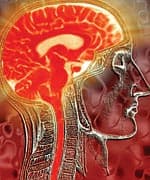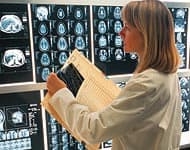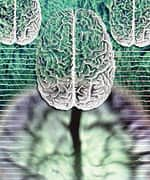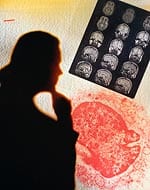Life Extension Magazine®
Over the past 10 years, scientific studies have revealed the remarkable effects that fish consumption has on neurological function. For instance, in both middle-aged and older study subjects, cognitive decline occurs less frequently in those who eat the most fish. In elderly subjects, the risk of dementia is reduced in those consuming as little as one fish meal a week.1 Even in children, a deficiency of the fatty acids found in fish is associated with learning disorders.2 The omega-3 fatty acids in fish oil are vital to brain cell structure and function. Based on the brain’s critical need for omega-3 fatty acids, scientists have developed a compound that takes the DHA found in fish oil and binds it to a lecithin extract that has been shown to reduce the risk of cognitive dysfunction in the elderly. Laboratory studies document that this patented compound delivers higher DHA concentrations to brain cells. When humans with learning disabilities consumed this DHA-lecithin extract for three months, the clinical response was 2.4 times greater compared to placebo.3 The good news is that this exciting compound has been added to a popular formula used to enhance cognitive function. This means that consumers can avail themselves of this novel technology without spending additional money or swallowing extra pills. The omega-3 fatty acids in fish oil have been documented to provide multiple health benefits. As a result of numerous scientific reports, consumers are gobbling down record amounts of fish oil supplements to protect against heart attack and relieve inflammatory disorders. Most people are unaware, however, of research showing that the DHA fraction of fish oil is of critical importance for brain function in both young and old individuals. As the major structural and functional component of the central nervous system, DHA (docosahexaenoic acid) constitutes as much as 30-50% of the total fatty acid content of the human brain. At the beginning of life, DHA is essential for the growth and functional development of the brain. DHA deficiencies in infancy have been associated with visual impairment and the later development of disorders including attention deficit hyperactivity disorder (ADHD). DHA is required for the maintenance of normal brain function in adults, including learning and memory. Low levels of DHA have been shown to be a risk factor for Alzheimer’s disease.4
Impressive Animal ResearchExperimental studies of mice and rats have been conducted to clarify the effects of DHA on learning and memory. These studies clearly indicate that DHA deficiency is associated with a loss of discriminative learning ability, while omega-3-enriched diets increase learning ability in elderly animals.5 The Japanese research team Lim and Suzuki demonstrated superior maze-learning ability in young and old mice fed a DHA-supplemented diet. After four months on the diet, the mice made significantly fewer mistakes and spent less time in the maze than the control group. They even performed better than young rats on the control diet.6 When the researchers studied the relationship between the time of DHA intake and maze behavior, they found that an improved maze-learning ability was evident at one month after the feeding started, whereas increased DHA levels in the brain were apparent as early as two weeks. These results suggest that improvement in learning ability occurs rather quickly after DHA is incorporated in the brain.7 By controlling chronic inflammation, omega-3 fatty acids may help reverse brain impairment associated with aging and degenerative diseases. In studies with aged and young rats, DHA supplementation significantly decreased free radical-induced levels of lipid peroxide in the hippocampus, a brain region involved in memory, and also reduced errors in maze learning.8 DHA Deficiency Linked to DementiaChanges in the fatty acid composition of brain lipids during aging appear to be correlated with a deterioration of the central nervous system. Knowing that DHA constitutes a major portion of the fatty acids in the brain, it may not be surprising that low DHA levels are shown to be a significant risk factor for the development of Alzheimer’s disease.
In a study tracking DHA levels in 1,188 elderly American subjects for 10 years, Alzheimer’s disease was 67% more likely to develop in individuals with DHA levels in the lower half of the distribution.9 Brain cholinergic systems are generally thought to be critical for memory function. Dysfunction of the central cholinergic system has been seen both in patients with vascular dementia and in those with Alzheimer’s-type senile dementia. In a study of stroke-prone spontaneously hypertensive rats, DHA was demonstrated to increase choline and acetylcholine levels in the brain, while improving passive avoidance performance.10 Interesting results from a Japanese clinical trial on DHA and dementia provide encouragement for further research. This pilot study involved 20 elderly people (average age of 83) with moderately severe dementia induced by ischemic stroke. The participants all lived in the same home for the elderly and ate the same food. They were divided into two groups according to age and baseline scores on psychometric tests. The individuals in the treatment group received 720 mg of DHA daily for one year. Significant improvement in the dementia scores was noticeable after three to six months of DHA supplementation. The control group showed no improvement.11 In a study of 815 Chicago residents who were 65 years of age or older, the risk of developing Alzheimer’s disease over four years was 60% less for those who ate fish at least once a week than for those who rarely or never ate fish.1 Lecithin Extract Counters Brain AgingAt one time, soy lecithin was an enormously popular supplement. People would literally eat lecithin granules or sprinkle it on their cereal every morning. With the discovery of extraction methods that concentrate its active constituents, lecithin has fallen out of favor, since consumers can now obtain its cognition-enhancing benefits in a pill. One of lecithin’s most effective brain-protecting extracts is phosphatidylserine, a naturally occurring compound found in every cell membrane in the body. Phosphatidyl-serine supports healthy levels of the neurotransmitter acetylcholine, facilitates brain cell energy meta-bolism, and provides structural support for brain cell membranes. While phosphatidylserine has demonstrated impressive results in clinical trials, you will soon learn how combining it with DHA can improve its efficacy even more. Several studies confirm the benefits of phosphatidylserine as a key component in fostering healthy brain function. Additional studies suggest that phosphatidylserine is helpful not only in treating cognitive decline, but also in avoiding its onset. For example, a clinical study was conducted of dementia patients aged 65-91. One group received 300 mg of phosphatidylserine daily while the other was given a placebo. At the end of the six-week trial period, the phosphatidylserine group showed significant improvement over the placebo group in all measured tests of memory and cognition.12 In another placebo-controlled, double-blind study, Alzheimer’s patients taking 300 mg of phosphatidylserine daily performed significantly better on standardized memory tests at the end of the 12-week trial period than did the study participants who received placebo. Importantly, those patients who were the least afflicted by dementia demonstrated the greatest benefit from phosphatidylserine therapy. These results suggest that beginning supplementation very early on, or perhaps even before the appearance of symptoms, can help prevent age-related loss of memory and other cognitive impairments.13 Another study compared the effects of phosphatidylserine to placebo in 425 elderly patients, each with some degree of cognitive decline. When compared to a control group taking placebo, those receiving 300 mg a day of phosphatidylserine significantly improved their scoring on tests measuring both cognitive and behavioral performance. The people taking phosphatidylserine also showed markedly improved motivation, initiative, interest in surrounding environments, and socialization. Throughout the six-month trial, no one taking phosphatidylserine exhibited any side effects.14 Positron emission tomography (PET) imaging measures energy production across the brain. In advanced-stage Alzheimer’s patients, PET scans revealed that after taking 500 mg of phosphatidylserine each day for three weeks, every study participant showed significantly enhanced glucose metabolism across all brain regions, compared to baseline scans.15 | |||
Brain Cells Need DHA and PhosphatidylserinePhosphatidylserine is the major lipid required to maintain the structural integrity of brain cells. Part of the unique function that DHA plays in protecting the brain involves its role in facilitating the synthesis of structural lipids (such as phosphatidylserine) in nerve cell membranes.16 In the brain, DHA is enzymatically combined with phosphatidylserine (and glyceryl-phosphoryl-choline) to form cell membrane phospholipids needed for nerve cell expansion.17 Substantial laboratory research over the past two decades suggests that phosphatidylserine’s ability to improve cognitive skills is greatly increased in the presence of DHA.
Brain cell membranes are highly enriched with DHA (when DHA is physically available). Dietary DHA deficiency can result in neurological disorders such as depression, memory loss, and dementia.18 Brain cell survival is highly dependent on the availability of DHA to facilitate the incorporation of phosphatidylserine in its membrane.19 Scientists have discovered that DHA attaches itself to phosphatidylserine molecules, and acts as an important ally in the promotion of brain cell energy production. A number of brain researchers, such as Dr. Norman Salem, head of the Laboratory of Membrane Biochemistry and Biophysics at the National Institutes of Health, are convinced that phosphatidylserine with attached DHA is among the most critically important molecules for healthy brain function. Scientists believe that phosphatidylserine supplementation works optimally if DHA levels are kept commensurately high.20 Combining DHA and PhosphatidylserineIn response to an increasing body of research showing the intricate relationship between DHA and phosphatidylserine (PS), scientists have developed a phosphatidylserine (PS)-DHA compound designed to be incorporated directly in the membranes of brain cells. The acronym for this novel compound is PS-DHA. To evaluate the effects of PS-DHA on memory loss, a study was conducted on middle-aged rats with laboratory-induced accelerated brain aging. Administering traditional sources of DHA did not have an effect on this experimental model, but the group receiving the PS-DHA compound was able to attain a great deal of protection against this neurological challenge. When the brains of these animals were analyzed, there was more DHA incorporated in the cells of the group receiving the PS-DHA than in those receiving other omega-3 agents.3
A randomized, double-blind, placebo-controlled study of humans with attention deficit hyperactivity disorder (ADHD) was conducted using PS-DHA. The aim of the study was to improve behavioral and learning disabilities in patients with ADHD. The psychological evaluation included the Connor’s scoring test and computer-based analysis (T.O.V.A.). At the end of three months, the group receiving the PS-DHA showed a total response of 47% compared to only 19% in the placebo group.3 GPC’s Role in Restoring Cognitive FunctionLike phosphatidylserine, glyceryl-phosphoryl-choline, or GPC, is a key structural component of brain cell membranes. GPC is approved as a drug in the European Union, where physicians prescribe it to their patients with dementia and pre-dementia. In the US, however, GPC is available as a dietary supplement. One of GPC’s cognition-restoring mechanisms is its ability to maintain optimal acetylcholine levels in the brain. The neurotransmitter acetylcholine plays critical roles in memory and other cognitive functions.21 Three double-blind trials have demonstrated GPC’s ability to improve mental acuity in healthy young adults. In studies with middle-aged participants, GPC supplementation led to improvements in several tests of mental performance, including reaction time. Eleven trials to date have focused on the use of GPC in seniors. In studies gauging GPC’s effects on a total of 1,799 participants with minor to severe cognitive deficits, GPC supplementation helped improve memory, attention, and social behavior. Many patients receiving GPC developed renewed interest in relatives and friends, became more capable of self-care, and showed marked improvements in depression, irritability, and emotional function.21 A double-blind, placebo-controlled trial of GPC versus placebo was conducted on Alzheimer’s patients at the National Institute on Aging in Mexico City. Following six months of therapy, participants who took 400 mg of GPC three times daily demonstrated significant improvement on a battery of cognitive tests, including the Alzheimer’s Disease Assessment Scale-Behavioral Subscale. These results suggest that GPC produces marked improvements in Alzheimer’s patients.22
In other promising studies, researchers found that GPC sped recovery and improved quality of life in patients who had undergone surgery. Following bypass and other major invasive procedures, many patients experience problems with cognition, memory, and depression. In four trials with GPC involving a total of 2,804 post-surgical patients, fully 95% showed marked improvement in space-time orientation, degree of consciousness, language, motor capacity, and overall quality of life.22 GPC may be very valuable for patients who have recently suffered head injuries, including subdural hematomas, cerebral contusions, and cerebral concussions. In fact, a 2003 study showed that 96% of the patients with substantial cognitive deficits resulting from their injuries had marked improvement at the end of a three-month period during which they received 800-1000 mg of GPC daily.23 Inhibiting the Acetylcholine-Degrading EnzymeIn recent years, a number of mechanisms of brain aging have been identified, along with potential therapeutic strategies. As organisms age, an enzyme called acetylcholinesterase increases in the brain. Since this enzyme’s job is to degrade the neurotransmitter acetylcholine, the result of excess acetylcholinesterase can be severe short-term memory-loss problems. In laboratory experiments in India in 2004, researchers discovered that ashwagandha root extract inhibits acetylcholinesterase, much the same way as Aricept®, a prescription drug currently used in the treatment of Alzheimer’s disease.24 In tests with laboratory mice, ashwagandha demonstrated the ability to promote memory retention in response to experimentally induced amnesia,25 and to protect the brains of laboratory rats against artificially induced stroke.26 Making Old Rat Brains Grow YoungerIn groundbreaking studies at Tufts University, laboratory rats (the equivalent of 60- to 65-year-old humans) were fed dried blueberry extract at a dose calibrated to be the human equivalent of one-half cup of blueberries per day. Three other groups of rats received spinach extract, strawberry extract, or a control diet. After eight weeks on the regimen, the investigators evaluated the rats—now equivalent in age to 70- to 75-year-old humans—using various tests of memory function.27 In neuromotor function tests, the blueberry-fed rats significantly outperformed the other groups. These rats were much better able to walk the length of a narrow rod and balance on an accelerating rotating rod compared to the other groups.27 This was indeed a stunning finding within the conventional medical research community, as mainstream scientists have for some time tended to accept as established fact that age-related neuromotor dysfunction is irreversible. These findings appear to flatly contradict this notion. Blueberry extract was clearly capable of reversing this aging process!27 The blueberry-supplemented rats also demonstrated improved learning and memory skills as they navigated mazes and found—and then remembered—the location of an underwater platform on which they could rest from swimming. When scientists examined the brain tissues of these rats, they found that dopamine levels were much higher than in the brains of rats in the other groups. Dopamine is an essential neurotransmitter that enables smooth, controlled movements as well as efficient memory, attention, and problem-solving function. The researchers speculated that blueberry extract might also increase the fluidity of brain cell membranes while reducing levels of inflammatory compounds, thus slowing the brain’s normal aging process.27 These findings have promising implications for aging humans. Older adults tend to fall or stumble—sometimes with catastrophic consequences—because their brains become less adept at monitoring and modulating swaying motion, due to slowing of neural signals in the aging human brain. Older people likewise tend to suffer memory loss and an inability to learn new behaviors in ways that can starkly limit their ability to lead productive, satisfying lives. By combating the deterioration of memory and neuromotor function that often accompanies aging, blueberries may help support more youthful brain function. | |||
Regenerating NeuronsIn an important, recently published study in Japan, scientists simulated the brain cell atrophy of Alzheimer’s disease by exposing laboratory mice to the toxic protein beta amyloid. Many researchers worldwide believe that beta amyloid protein contributes to the pathogenesis of Alzheimer’s disease in humans. Orally administered extract of ashwagandha helped damaged neurons of the brain to regenerate in the test animals!28 Ashwagandha improves alertness without causing the jitters that often accompany drugs like caffeine, and it also relieves anxiety and enhances learning ability.29
Pregnenolone is a hormone that is synthesized directly from cholesterol in the cell mitochondria. The body converts pregnenolone into other important hormones, including dehydroepiandrosterone (DHEA), various estrogens, progesterone, and testosterone.30 Aging causes a steep decline in the production of pregnenolone, as well as in the hormones for which it is a precursor. Progesterone is synthesized in the brain, spinal cord, and peripheral nerves from pregnenolone. Research strongly suggests that progesterone promotes the formation of myelin sheaths, the fatty layers of “insulation” that allow electrochemical signals to move efficiently from one neuron to another.31 Scientists believe that progesterone offers exciting treatment alternatives for the prevention of many degenerative brain conditions as well as cognitive impairment during aging.31 French researchers have shown that pregnenolone directly influences acetylcholine release in several key brain regions responsible for memory, cognition, and the sleep-wake cycle. They also demonstrated pregnenolone’s ability to promote new nerve growth. According to the study authors, “Our data demonstrate that [pregnenolone sulfate infusions] dramatically increase neurogenesis.” 32,33 Protecting Brain Cells Against Age-Related DamageThe brain generates a tremendous amount of free radicals as a part of its daily functioning. Some scientists believe that over the course of months and years, these free radicals may contribute to the impairment of healthy brain activity that occurs with aging. Grape seed extract has demonstrated remarkable success in blocking the formation of senile plaques that severely damage the brains of those with dementia. As a result of these attributes, many researchers now consider grape seed extract to be an essential nutrient for maintaining brain health and vitality. One of the most potent antioxidants available, grape seed extract possesses 20 times more free radical-fighting power than vitamin E and 50 times more than vitamin C.34 This remarkable antioxidant activity suggests that grape seed extract should become a part of any regimen to optimize brain health. In laboratory experiments, brain cells of rats treated with grape seed extract before exposing them to the toxic protein beta amyloid. While untreated rat brain neurons readily accumulated free radicals and subsequently died, the cells treated with the nutrient extract were significantly protected.35 In addition, a recently published 2006 study found that grape seed extract successfully inhibits the accumulation of age-related oxi-dative DNA damage in areas of the spinal cord and brain of aged albino rats.36 Improving Cerebral CirculationVinpocetine, a derivative of the periwinkle plant, was developed more than three decades ago for the purposes of combating cognitive decline. Like phosphatidylserine and GPC, it is available only by prescription in Europe. In the United States, vinpocetine is available without a prescription, as a nutritional supplement. One of vinpocetine’s most important benefits for improving cognition is its ability to increase blood circulation and enhance glucose utilization throughout the brain.37 This is critical, since blood flow and its life-sustaining supply of oxygen in the brain otherwise tend to diminish as people age. In three studies of older adults with memory problems associated with poor brain circulation, vinpocetine was much better than placebo in improving patients’ performance on comprehensive cognitive tests reflecting attention, concentration, and memory.38
Because vinpocetine may affect the clotting time of blood plasma, those who take the prescription drug warfarin (Coumadin®) should consult with their physicians before using this nutrient. Suppressing Inflammatory FiresA great danger to the aging brain is inflammation, which can destroy neurons and impair essential brain function. Used for centuries as a remedy for the pain and inflammation of arthritis, ginger blocks certain changes in brain cells that are associated with the development of Alzheimer’s. By incubating cells with ginger extract and various inflammation-provoking substances, scientists demonstrated in 2005 that ginger can inhibit activation of an inflammatory response in brain tissues. This led the investigators to suggest in the Journal of Alternative and Complementary Medicine that ginger extract “may be useful in delaying the onset and the progression of neuro-degenerative disorders.” 39 Protect Your Ability to Think and ReasonAs humans age, physical and biochemical changes in brain cells can lead to significant cognitive impairment.40 For many years, the conventional dogma was that forgetfulness, slowed speech, and difficulty with mental tasks were natural consequences of aging. The tragic loss of brain function as we age is not inevitable. Impressive research by scientists around the world has uncovered novel methods to help preserve our minds’ precious abilities. In order to safeguard our cognitive abilities, however, we need to be vigilant and take the necessary steps to protect against the ravages of brain cell aging. This article has introduced Americans to a novel phosphatidylserine-DHA compound that is just now becoming available. By utilizing all of the nutritional approaches described in this article, one takes advantage of a wealth of knowledge about protecting perhaps our most precious asset: our minds. It is encouraging that some of the most promising approaches to averting the consequences of brain aging are available as dietary supplements that are virtually free of the side effects associated with expensive prescription drugs. | ||
| References | ||
| 1. Morris MC, Evans DA, Bienias JL, et al. Consumption of fish and n-3 fatty acids and risk of incident Alzheimer disease. Arch Neurol. 2003 Jul;60(7):940-6. 2. McCann JC, Ames BN. Is docosahexaenoic acid, an n-3 long-chain polyunsaturated fatty acid, required for development of normal brain function? An overview of evidence from cognitive and behavioral tests in humans and animals. Am J Clin Nutr. 2005 Aug;82(2):281-95. 3. Unpublished data, Enzymotec Ltd, Israel. 4. Horrocks LA, Yeo YK. Health benefits of docosahexaenoic acid (DHA). Pharmacol Res. 1999 Sep;40(3):211-25. 5. Greiner RS, Moriguchi T, Hutton A, Slotnick BM, Salem N, Jr. Rats with low levels of brain docosahexaenoic acid show impaired performance in olfactory-based and spatial learning tasks. Lipids. 1999;34 SupplS239-43. 6. Lim SY, Suzuki H. Intakes of dietary docosahexaenoic acid ethyl ester and egg phosphatidylcholine improve maze-learning ability in young and old mice. J Nutr. 2000 Jun;130(6):1629-32. 7. Lim S, Suzuki H. Changes in maze behavior of mice occur after sufficient accumulation of docosahexaenoic acid in brain. J Nutr. 2001 Feb;131(2):319-24. 8. Gamoh S, Hashimoto M, Hossain S, Masumura S. Chronic administration of docosahexaenoic acid improves the performance of radial arm maze task in aged rats. Clin Exp Pharmacol Physiol. 2001 Apr;28(4):266-70. 9. Kyle DJ, Schaefer E, Patton G, Beiser A. Low serum docosahexaenoic acid is a significant risk factor for Alzheimer’s dementia. Lipids. 1999;34 SupplS245. 10 Minami M, Kimura S, Endo T, et al. Dietary docosahexaenoic acid increases cerebral acetylcholine levels and improves passive avoidance performance in stroke-prone spontaneously hypertensive rats. Pharmacol Biochem Behav. 1997 Dec;58(4):1123-9. 11. Terano T, Fujishiro S, Ban T, et al. Docosahexaenoic acid supplementation improves the moderately severe dementia from thrombotic cerebrovascular diseases. Lipids. 1999;34 SupplS345-6. 12. Delwaide PJ, Gyselynck-Mambourg AM, Hurlet A, Ylieff M. Double-blind randomized controlled study of phosphatidylserine in senile demented patients. Acta Neurol Scand. 1986 Feb;73(2):136-40. 13. Crook T, Petrie W, Wells C, Massari DC. Effects of phosphatidylserine in Alzheimer’s disease. Psychopharmacol Bull. 1992;28(1):61-6. 14. Cenacchi T, Bertoldin T, Farina C, Fiori MG, Crepaldi G. Cognitive decline in the elderly: a double-blind, placebo-controlled multicenter study on efficacy of phosphatidylserine administration. Aging (Milano.). 1993 Apr;5(2):123-33. 15. Klinkhammer P, Szelies B, Heiss W. Effect of phosphatidylserine on cerebral glucose metabolism in Alzheimer’s disease. Dementia. 1990;1:197-201. 16. Kim HY, Bigelow J, Kevala JH. Substrate preference in phosphatidylserine biosynthesis for docosahexaenoic acid containing species. Biochemistry. 2004 Feb 3;43(4):1030-6. 17. Kidd PM. Neurodegeneration from mitochondrial insufficiency: nutrients, stem cells, growth factors, and prospects for brain rebuilding using integrative management. Altern Med Rev. 2005 Dec;10(4):268-93. 18. Lukiw WJ, Cui JG, Marcheselli VL, et al. A role for docosahexaenoic acid-derived neuroprotectin D1 in neural cell survival and Alzheimer disease. J Clin Invest. 2005 Oct;115(10):2774-83. 19. Akbar M, Calderon F, Wen Z, Kim HY. Docosahexaenoic acid: a positive modulator of Akt signaling in neuronal survival. Proc Natl Acad Sci USA. 2005 Aug 2;102(31):10858-63. 20. Kidd P. Phosphatidylserine: Nature’s Brain Booster for Memory, Mood, and Stress. St. George: Total Health Communications, Inc.; 2005. 21. Available at:http://vitanetonline.com/ forums/1/Thread/359#Message388. Accessed March 1, 2006. 22. De Jesus Moreno MM. Cognitive improvement in mild to moderate Alzheimer’s dementia after treatment with the acetylcholine precursor choline alfoscerate: a multicenter, double-blind, randomized, placebo-controlled trial. Clin Ther. 2003 Jan;25(1):178-93. 23. Mandat T, Wilk A, Manowiec R, et al. Preliminary evaluation of risk and effectiveness of early choline alphoscerate treatment in craniocerebral injury. Neurol Neurochir Pol. 2003 Nov;37(6):1231-8. 24. Choudhary MI, Yousuf S, Nawaz SA, Ahmed S, Atta uR. Cholinesterase inhibiting withanolides from Withania somnifera. Chem Pharm Bull (Tokyo). 2004 Nov;52(11):1358-61. 25. Dhuley JN. Nootropic-like effect of ashwagandha (Withania somnifera L.) in mice. Phytother Res. 2001 Sep;15(6):524-8. 26. Chaudhary G, Sharma U, Jagannathan NR, Gupta YK. Evaluation of Withania somnifera in a middle cerebral artery occlusion model of stroke in rats. Clin Exp Pharmacol Physiol. 2003 May;30(5-6):399-404. 27. Joseph JA, Shukitt-Hale B, Denisova NA, et al. Reversals of age-related declines in neuronal signal transduction, cognitive, and motor behavioral deficits with blueberry, spinach, or strawberry dietary supplements. J Neurosci. 1999 Sep 15;19(18):8114-21. 28. Kuboyama T, Tohda C, Komatsu K. Neuritic regeneration and synaptic reconstruction induced by withanolide A. Br J Pharmacol. 2005 Apr;144(7):961-71. 29. Available at: www.holisticonline.com/ HerbalMed/Herbs/h119.html. Accessed March 2, 2006. 30. Meieran SE, Reus VI, Webster R, Shafton R, Wolkowitz OM. Chronic pregnenolone effects in normal humans: attenuation of benzodiazepine-induced sedation. Psychoneuroendocrinology. 2004 May;29(4):486-500. 31. Schumacher M, Guennoun R, Robert F, et al. Local synthesis and dual actions of progesterone in the nervous system: neuroprotection and myelination. Growth Horm IGF Res. 2004 Jun;14 Suppl AS18-S33. 32. Mayo W, Lemaire V, Malaterre J, et al. Pregnenolone sulfate enhances neurogenesis and PSA-NCAM in young and aged hippocampus. Neurobiol Aging. 2005 Jan;26(1):103-14. 33. Mayo W, George O, Darbra S, et al. Individual differences in cognitive aging: implication of pregnenolone sulfate. Prog Neurobiol. 2003 Sep;71(1):43-8. 34. Shi J, Yu J, Pohorly JE, Kakuda Y. Polyphenolics in grape seeds-biochemistry and functionality. J Med Food. 2003;6(4):291-9. 35. Li MH, Jang JH, Sun B, Surh YJ. Protective effects of oligomers of grape seed polyphenols against beta-amyloid-induced oxidative cell death. Ann NY Acad Sci. 2004 Dec;1030:317-29. 36. Balu M, Sangeetha P, Murali G, Panneerselvam C. Modulatory role of grape seed extract on age-related oxidative DNA damage in central nervous system of rats. Brain Res Bull. 2006 Feb 15;68(6):469-73. 37. Szilagyi G, Nagy Z, Balkay L, et al. Effects of vinpocetine on the redistribution of cerebral blood flow and glucose metabolism in chronic ischemic stroke patients: a PET study. J Neurol Sci. 2005 Mar 15;229-230:275-84. 38. McDaniel MA, Maier SF, Einstein GO. “Brain-specific” nutrients: a memory cure? Nutrition. 2003 Nov;19(11-12):957-75. 39. Grzanna R, Phan P, Polotsky A, Lindmark L, Frondoza CG. Ginger extract inhibits beta-amyloid peptide-induced cytokine and chemokine expression in cultured THP-1 monocytes. J Altern Complement Med. 2004 Dec;10(6):1009-13. 40. Sirven J, Malamut B. Clinical Neurology of the Older Adult. Philadelphia, PA: Lippincott Williams & Wilkins; 2002. |








